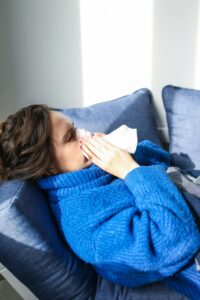Personal Trainer Discusses the Common Cold: What is it, How to Avoid it and Where Exercise Fits in
The Common Cold: What is it, How to Avoid it, and Where Exercise Fits In

Explaining the Common Cold and how it is Transmitted
The common cold is the most frequent illness you will have during your lifetime. More than 200 different viruses cause colds. Rhinoviruses and coronaviruses are to blame 25 to 60 percent of the time. Rhinoviruses often attack during the fall and spring seasons, while the coronavirus is common during the winter. Cold viruses are passed from person to person by being inhaled into the nose and air passageways. More severe viruses are transmitted more readily than mild ones because a greater amount of virus is passed into the air by coughing and sneezing. Cold viruses are also spread by simple hand to hand contact with an infected person or with contaminated objects such as door knobs, phones or computer keyboards. The virus itself can live for hours on hands and hard surfaces, then when the hand is brought to the nose or eyes, self-inoculation with the cold virus occurs. Damp, cold, or drafty weather does not increase the risk of getting a cold. According to most cold researchers, cold or bad weather simply brings people together indoors and leads to more person-to-person-contact.
Ways to Avoid Contact and Contamination
If you are sick yourself, you should always cover your mouth and nose when coughing or sneezing by using a handkerchief, tissue, or even your bent arm! Once the virus is transmitted to hands or hard surfaces, as stated previously, it can survive for several hours outside the body waiting to spread to the next person. The best preventative measures for this are proper hand washing, with hot water and soap for the appropriate amount of time (singing row row row your boat three times in your head is approximately the amount of time you’re looking for). Also, spray lysol to decontaminate hard surfaces and always try to avoid touching your face with your hands. Vitamin C is a common remedy. It can help increase immune defense, as well as, if infected reduce the severity and duration of the symptoms. Whether one gets sick with a cold after a sufficient amount of a virus has entered the body depends on many factors that affect the immune system. Mental stress, low food intake, rapid weight loss, lack of sleep and poor hygienic practices have all been associated with impaired immune function and increased risk of infection.
Exercise and the Cold
Can a cold be prevented through regular exercise? When surveyed, people who exercise on a regular basis report fewer colds than their inactive peers. Several exercise training studies with adults support this belief. In these studies, subjects in the exercise groups walked briskly 35-45 minutes, five days a week, for 12-15 weeks during the winter/spring or fall, while the control groups remained physically inactive. The results showed that walkers experienced about half the days with cold symptoms of the sedentary controls. During moderate to vigorous exercise several positive changes occur in your immune system, including an enhanced movement of important immune cells throughout the body. Stress hormones, which can suppress immunity are not elevated during moderate exercise. Although the immune system returns to pre-exercise levels very quickly after the exercise session is over each session represents a boost that reduces the risk of infection over the longterm. Heavy doses of exercise can, however, have the opposite effect. For example, after running a marathon race the body is inflamed for about one-half day with high stress hormones, cytokines and suboptimal immune function. During periods of heavy training, the immune system reflects the physiologic stress experienced by the athlete and illness rates climb. Even a good thing like exercise can be carried too far, and each individual needs to find the right balance between training workloads and rest.
The best way to keep immune defenses operating optimally, practice good hygiene by washing your hands frequently and keep them away from your eyes, mouth and nose. Be sure that you are getting an adequate amount of sleep on a regular schedule. Sleep disruption has been linked to suppressed immunity. Eat a well balanced diet to increase vitamin and mineral levels in the body. Exercise moderately on most days of the week and avoid overtraining and fatigue which can weaken your immune system. If you follow these simple guidelines it will help you keep yourself healthier and less susceptible to the common cold.
Written By: Shannon ACSM-cpt
Take action… Now!
Visit us:
Inside of the Flyers Training Center
601 Laurel Oak Rd.
Voorhees, NJ 08043




